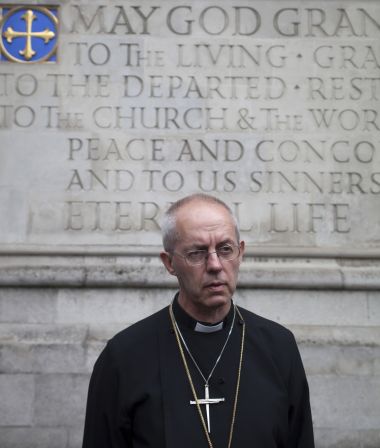Justin Welby: 'Profound regret and deep sorrow' at Dresden bombing

The Archbishop of Canterbury has spoken of his "deep sorrow" at the bombing by allied forces of Dresden in Germany.
Archbishop Justin Welby, speaking at the Frauenkirche in Dresden to mark the 70th anniversary of the bombing, said: "Much debate surrounds this most controversial raid of the allied bombing campaign. Whatever the arguments, events here 70 years ago left a deep wound and diminished all our humanity. So as a follower of Jesus I stand here among you with a profound feeling of regret and deep sorrow."
In front of a congregation that included the President of Germany, Joachim Gauck, and German church leaders the Archbishop acknowledged that to be welcomed into the city and invited to share in this event as a British church leader was "nothing short of miraculous".
The Archbishop, who has a background in reconciliation ministry at Coventry cathedral, itself rebuilt out of the ruins of a city devastated by German raids, described how over three days in February in Dresden, allied bombers "brought death and destruction on a scale and with a ferocity it is impossible to imagine."
He said that in the rage of war, hearts inevitably harden and increasingly brutal and devastating force is unleashed. "Walking together as friends requires talking together in truth," he added.
The power of yesterday's address, underpinned by the theology of forgiveness and reconciliation, was however overshadowed today by a war of words with the Daily Mail over a story headlined: "Archbishop Says Sorry For Bombing the Nazis."
The office of the Archbishop of Canterbury condemned the story as "manifestly false".
A spokesperson for the Archbishop of Canterbury said: "The Archbishop's comments were a reflection in a solemn ceremony on the tragedy of war."
Lambeth Palace said Archbishop Welby had "very carefully" avoided apologising.
At the time of writing this article, the Daily Mail article headline remained: "Archbishop 'says sorry' for bombing the Nazis: Justin Welby attacked for 'bizarre apology' for Dresden raids, but makes no reference to RAF heroes killed by Hitler."
The Mail went on to quote Tory MP Philip Davies as saying: "These remarks do sound to me like an apology. For the Archbishop to make an apology for our defeat of Hitler is bizarre. I would have thought the last thing we should be doing is apologising. We should be praised for defeating Hitler. These words are an insult to the young men who gave their lives in the defeat of Germany."
The battle escalated on the Archbishop's own blog, where he wrote: "Dresden on the 70th anniversary of the allied bombing is a place of deep emotion and sorrow."
He said the feeling was different but parallel to that of Coventry cathedral where he worked for five years, and both are very powerful reminders of what Wilfred Owen called "the pity of war".
The Archbishop continued: "What a sadness then that late in the evening someone showed me a headline in the Daily Mail saying that I had apologised for the RAF bombing the Nazis. No honest reading of what I said in the church and on the BBC afterwards could come anywhere near such an idea. Contrary to the Mail's report, on the BBC I spoke clearly of the bombing of British cities, mentioning especially Coventry and London. I also spoke of the terrible losses of the heroic crews of Bomber Command. My grandmother's brother was killed on his first mission, in a Wellington."
Asked also on Radio 5 Live if Britain should apologise for Dresden, the Archbishop added: "That's a very complicated question, because when you listen to people who were in Bomber Command and you hear of their suffering, I lived in Coventry and you see the suffering there, in London we know of the Blitz, and in many other cities right across the United Kingdom and round the world, I think it's more complicated than 'should we apologise?'. I think there is a deep need for profound sorrow at the events and the causes of such dreadful times as Europe lived through. And there's also reason for hope and encouragement that Europe has become a centre of reconciliation in the world - a great miracle."











